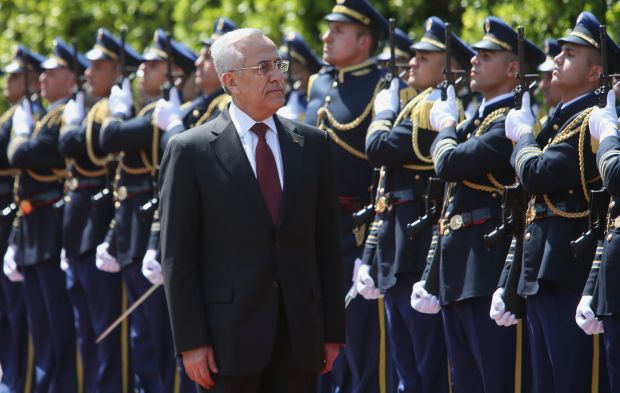
Lebanese President Michel Suleiman reviews an honor guard as he leaves the presidential palace, ending his six-year term, in the Beirut suburb of Baabda on Saturday May 24, 2014. (AP Photo/Hussein Malla)
London, Asharq Al-Awsat—With President Michel Suleiman’s term in office coming to an end on Sunday, Lebanon is officially entering a “presidential vacuum,” with rival March 14 Alliance and March 8 Alliance lawmakers so far unable to choose the next head of state.
Suleiman delivered his farewell speech on Saturday, in which he said that dialogue is the only way to overcome the deep divisions that have beset the country.
He said: “We overcame difficult circumstances, [hence] my call for sustained dialogue, which is the only guarantor for solving dilemmas,” adding that “preserving our national unity is the priority.”
The outgoing president proposed a number of constitutional amendments to increase the powers of the presidency before vacating the Baabda presidential palace.
“My [experience] with the constitution over the past six years has revealed several flaws that have allowed for obstructions to the political system, [so I have formed] a committee to discuss suggestions to amend the constitution and sent the suggestions to the parliament,” he said.
Suleiman leaves office at a time when many Lebanese fear that a presidential vacuum could have an adverse effect on the political situation in the country in general, with some parties threatening to boycott all parliamentary sessions after Sunday until a new president can be chosen. Lebanon’s parliament is set to discuss a number of important issues in the coming weeks and months, including a bill on public sector salaries.
The powers of the presidency now fall to Lebanon’s cabinet, under the premiership of Tammam Salam, until lawmakers can elect a new president.
Lebanese Forces leader and March 14 Alliance presidential candidate Samir Geagea made a last-minute appeal for a parliamentary quorum on Saturday. “March 14 lawmakers are going to parliament this evening . . . We still have the chance to elect a new president before midnight,” he said in a press conference on Saturday.
March 14 lawmakers flocked to parliament on Saturday evening in a last-ditch attempt to secure a quorum for a vote. “We came here today to say that until the last minute we maintain our right to elect a president within the constitutional deadline,” Future Movement MP Mohammad Qabbani told Lebanon’s Al-Jadeed TV.
Also speaking on Saturday, Future Movement leader and former prime minister Saad Al-Hariri warned against a presidential vacuum, saying it would endanger the democratic system in the country.
“We should deal with a void in the president’s seat as a serious threat to the integrity of the democratic system. [That] makes the presidency a target for blackmail with a void and unknown [future],” Hariri said in a statement.
In earlier comments, Lebanese parliamentary speaker Nabih Berri said if a new president is not elected within a few days after the end of Suleiman’s term, he would call an extraordinary session of parliament session every 15 days.
“The problem is not with Parliament, but with politicians who have failed to agree on a [presidential] candidate,” Berri said.
